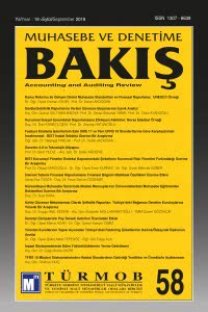ÜNİVERSİTELERİMİZDE VERİLEN DENETİM EĞİTİMİNİN TEKNOLOJİYE BAĞLI OLARAK DEĞİŞEN DENETİM OLGUSU VE DENETÇİ PROFİLİ KARŞISINDAKİ DURUMU
Teknolojideki ilerlemeler hayatın her alanında olduğu gibi işletmecilik uygulamalarında da radikal değişimlereyol açmıştır. Teknolojideki gelişmelere bağlı olarak işletme faaliyetleri sonucu ortaya çıkan ekonomik olay veişlemler tamamen veya kısmen artan bir biçimde elektronik ortamda cereyan etmeye başlamıştır. Bu durum da,işletmenin finansal nitelikli olay ve işlemlerini konu edinen muhasebe sisteminin geleneksel ortamdan elektronik ortama taşınmasına yol açmıştır. Söz konusu ortam değişikliği, kağıda yazılı dokümanlara dayalı yürütülengeleneksel denetim tarzında da önemli değişikliklerin oluşumunu tetiklemiştir. Meydana gelen hızlı değişimeparalel olarak bir yandan mesleği icra edenlerin hem kendilerini hem de geleneksel denetim uygulamalarını, biryandan da mesleğe eleman yetiştiren kurumlarının mevcut denetim eğitim materyal ve yöntemlerini baştan ayağa yenilemesi gerekmektedir. Bu çalışmanın amacı teknolojideki gelişmelere bağlı olarak değişen denetim olgusu ve denetçi profili karşısında Türk üniversitelerinde verilen denetim eğitiminin yeterliliğini Bilgi Teknolojileri boyutundan ampirik olarak tespit etmektir
Advancements in the technology have caused radical changes in business practices as in every part of daily life. Economic events and transactions arised from business activities alongside technological improvements have started to occur increasingly in electronic environment partially or fully. This situation has caused accounting system dealing with business’ financial events and transactions to switch from traditional environment toelectronic environment. Switching from traditional environment to electronic one has also triggered occurrenceof significant changes in traditional paper-based auditing style. In parallel to such a swift changes taking place,both those performing the profession have to change themselves and their traditional auditing practices and those institutions preparing persons for the profession have to change auditing educational materials and methodsfrom head to toe. The purpose of this study is to empirically identify the sufficiency of auditing education given in Turkish universities from the IT point of view given the fact of changing auditing concept and auditor profile associatedwith technological improvements
___
- Albrecht W.S. ve Sack R.J., “Accounting Education: Charting the Course Through a Perilous Future”, Accoun- ting Education Series , 2000, Vol.. 16. Sarasota, Florida: American Accounting Association.
- Amaravadi, Chandra S., “The World and Business Computing in 2051”, Strategic Information System, 2003,12, ss.373-386.
- Greenstein, M. ve McKee, T. E., “Assurance Practioners’ and Educators’ Self-Perceived IT Knowledge Level: An Empirical Assessment”. The International Journal of Accounting Information Systems, 2003,5, ss.217- 219.
- Howieson, B., “Accounting Practice In The New Millenium : Is Accounting Education Ready To Meet The Chal- lenge?”, The British Accounting Review, 2003, 35, ss.99-103.
- Institute of Chartered Accountants in England and Wales (ICAEW), “Added-Value Professionals: Chartered Ac- countants in 2005 (Rapor)”, 1996, Londra.
- Link, C. , “The Future For Business (Rapor)”, 1998, The Institute of Chartered Accountants in Autralia, Melbo- urne. Roest, P., Sheldon, J. ve Simister, M.,“CFO of the Future (Rapor)”, 1998, The Institute of Chartered Accoun- tants in Autralia.
